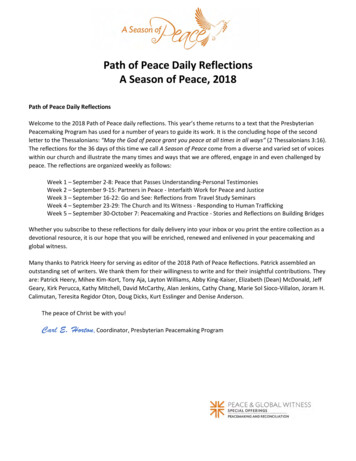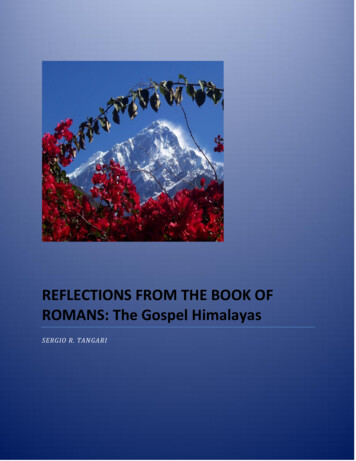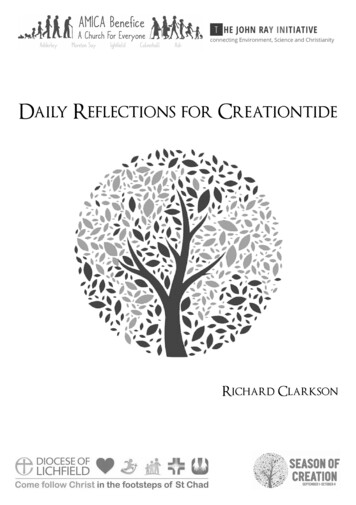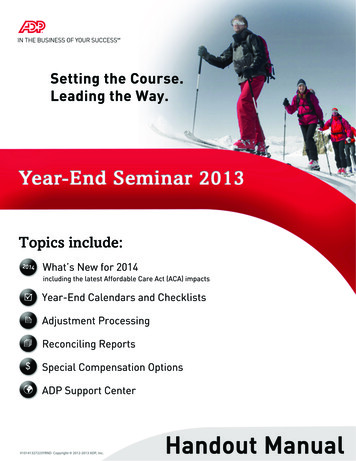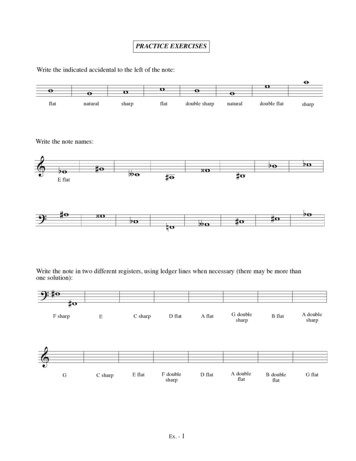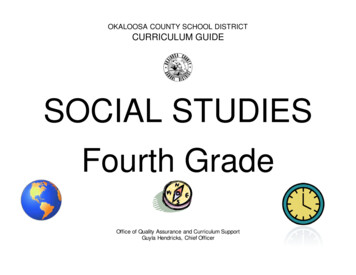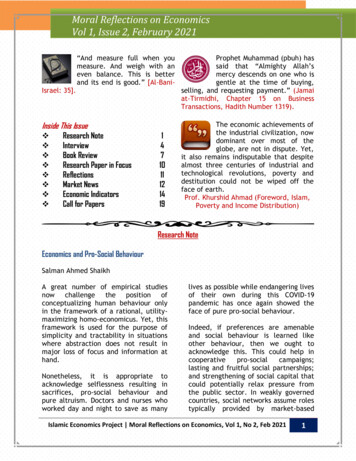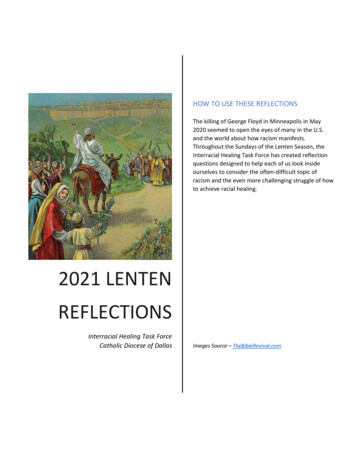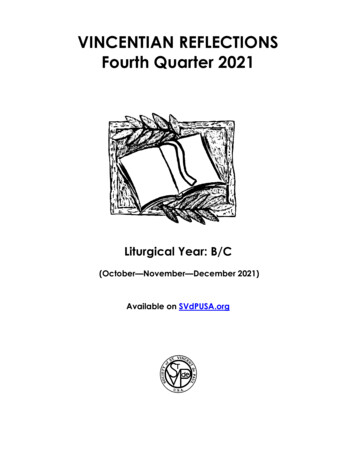
Transcription
VINCENTIAN REFLECTIONSFourth Quarter 2021Liturgical Year: B/C(October—November—December 2021)Available on SVdPUSA.org
HOW TO LEAD THE VINCENTIAN REFLECTIONS IN A CONFERENCEINTRODUCTION:Leader describes to the group the process which is going to take place: Provide a copy for each member of your Conference for their personal reflection Stress that sharing is not compulsory and mention the need for confidentiality Ask, or assign, different members to read the different sections:-Gospel reading-Reflection-Vincentian MeditationOPENING PRAYER/QUIETING DOWN PERIODLeader invites group to: Become relaxed and aware of God’s presence with us “Let Go” of distractions and quietly pray to the Holy SpiritREADING OF THE VINCENTIAN WEEKLY REFLECTION Each section is read aloud, slowly and prayerfully, by the different members Hearing different voices will allow different emphasis on words/phrasesQUIET PERIODLeader invites everyone: To quietly reflect on the readings and notice if anything strikes them Introduces the Discussion Question suggested in the Reflection Allows 2-3 minutes of quiet – don’t hurry this. God speaks to us in the silence.SHARINGLeader invites members who wish to share on the Discussion Question, or on howthe one of the readings struck them. Possibly not everyone will share, but time should beallowed for each person who wishes to share his/her thoughts. It is important that you resist theurge either to prod members to share, or to try to “fill the silence” with your own thoughts.CLOSING PRAYERLeader closes the Prayer Reflection by beginning the Closing Prayer, and all answer theresponse (in bold).(This entire process should take about 10-15 minutes)
INTRODUCTIONSt. Vincent de Paul never wrote a book about his spiritual teachings. But we find theliving voice of the saint in his letters and conferences in which he trained his followersfor the mission of service to the poor.The two fundamental sources of his teaching are the GOSPEL and LIFE. He wanted hisfollowers to put the whole of the Gospel into the whole of their lives, and he neverwearied of deepening both with all the faith that God had put into his heart. That is whyall that Vincent says to us has the simplicity of our everyday life and the penetratingstrength of the Word of God.The Vincentian Weekly Reflections are therefore offered to all who strive to serve thepoor in the spirit of St. Vincent de Paul. The prayer and reflections are based on theSunday Gospel of the Liturgical Calendar, together with the feast days of some of thesaints of our Vincentian Family. Each reflection offers a time for prayer, silence anddiscussion so that our everyday life, like Vincent, can become penetrated with thestrength of the Word of God.You may want to run copies for each member of your Conference so that theymay take them home for personal reflection during the week.
LITURGICAL YEAR-Cycle BFourth Quarter - 72431Twenty-Seventh Sunday in Ordinary TimeTwenty-Eighth Sunday in Ordinary TimeTwenty-Ninth Sunday in Ordinary TimeThirtieth Sunday in Ordinary TimeThirty-First Sunday in Ordinary Time1271421272828All Saints DayAll Souls DayThirty-Second Sunday in Ordinary TimeThirty-Third Sunday in Ordinary TimeFeast of Christ the KingMiraculous MedalFirst Sunday of Advent (Start of Year C)St. Catherine Laboure581212192526Second Sunday of AdventImmaculate ConceptionOur Lady of GuadalupeThird Sunday of AdventFourth Sunday of AdventFeast of the Nativity of the LordFeast of the Holy Family of Jesus Mary and erDecemberDecemberDecemberDecemberDecember
TWENTY-SEVENTH SUNDAY IN ORDINARY TIMEOctober 3, 2021Gospel: (Mark 10:2-16)People were bringing children to him that he might touch them, but the disciples rebuked them.When Jesus saw this he became indignant and said to them, “Let the children come to me; donot prevent them, for the kingdom of God belongs to such as these. Amen, I say to you,whoever does not accept the kingdom of God like a child will not enter it.” Then he embracedthem and blessed them, placing his hand on them.Reflection:The disciples had been with Jesus and heard his teaching for quite some time, but theydeveloped a hardness of heart, and so Jesus became indignant. This gospel is about humanhardness of hearts and about to whom the kingdom of God belongs; not to those with hardhearts, but to the innocent ones who keep themselves turned toward God. Jesus illustrates thisby saying “accept the kingdom of God like a child.” Anything else he might have said tohis disciples was not recorded; but we might surmise that he was saying we must lose ourhardness of hearts by being open and accepting like little children, by being innocent likechildren, by being trusting like children, by not picking up the sinful baggage that develops aswe grow into and live adulthood. We must lose our schema of things so we can find God’sintention. Lose the hardness of heart. Find the kingdom. Our embracing the kingdom embodiesour being embraced by Jesus. (Living Liturgy, p.220)Vincentian Meditation:Simplicity “is the virtue I love most.” In St. Vincent’s eyes, Jesus is utterly simple—like a child.He speaks the truth. He says things as they are. His intentions are pure, referring all things inlife to God. To St. Vincent, simplicity meant genuineness and transparency. Vincent alwaysknew that all good comes from God and he acknowledge his own limitedness and sinfulness.Vincent lived with an exuberant confidence in God’s forgiveness and love.” (Maloney, Go! On theMissionary Spirituality of St. Vincent, p. 131-132)Discussion: (Share your thoughts on the readings after a moment of silence)Has a “hardness of heart” crept into our lives of service?Closing Prayer:Those who walk with simplicity proclaim the steadfast love of our God. Intrust, we pray,-Lord, give us genuine and transparent hearts.Make us open and trusting like children,-Lord, heal our “hardness of heart.Teach us to let go of the baggage that has developed in our lives,-Lord, help us to live with confidence in your forgiveness.Give us the joy and openness of a child,-Lord, may we find you in our service to those who are poor.Amen
TWENTY-EIGHTH SUNDAY IN ORDINARY TIMEOctober 10, 1018Gospel: (Mark 10: 17-30)As Jesus was setting out on a journey, a man ran up, knelt down before him, and asked, “Goodteacher, what must I do to inherit eternal life?” Jesus answered, “Why do you call me good?No one is good but God alone. You know the commandments: You shall not kill; you shallnot commit adultery; you shall not steal; you shall not bear false witness; you shall notdefraud; honor your father and your mother.” He replied and said to him, “Teacher, all of these Ihave observed from my youth.” Jesus, looking at him, loved him and said to him, “You arelacking in one thing. Go, sell what you have, and give to the poor and you will have treasure inheaven; then come, follow me.” At that statement his face fell, and he went away sad, for hehad many possessions.Reflection:In reply to the man’s profession that he has kept the commandments, Jesus lovingly says tohim, “You are lacking in one thing.” This suggests that, flowing from an undivided heart,dispossessing oneself and following Jesus are one and the same thing. To turn this around: ifone is to follow Jesus one must come empty-handed. This doesn’t mean that we literally selleverything; we all have family and social obligations that make having things a necessity. Jesusis saying that we can’t let possessions (or anything else, for that matter) divide our hearts.Too often possessions possess us; we must let go so only God can possess us. It is hard toenter the kingdom of God because too often our hearts are divided-we want to let go andfollow Jesus at the same time we want to hang onto our possessions and, indeed our verylives! Divided hearts just won’t do. God wants our all so God can give all in return. (Living Liturgy,p. 224)Vincentian Meditation:“Did the young man tend to rely too much on negative goodness? He had not broken thecommandments, but how much good had he done for others? Was Our Lord saying to him:“With all your possessions, with all your wealth, with all that you could give away, whatpositive good have you done to others? Have you gone out of your way to help and comfortand strengthen others as you might have done?” Perhaps Our Lord was saying to him: “Stoplooking at goodness as consisting in not doing things. Take yourself: take all that you have andspend yourself and your possessions on others. Then you will find true happiness in timeand in eternity.” (McCullen, Deep Down Things, p. 715)Discussion: (Share your thoughts on the readings after a moment of silence)What “possessions”- time, money, talent-are you called to give to the poor?Closing Prayer:For the grace to let go of my possessions,-God of mercy, hear my prayer.For the grace to have an undivided heart,-God of mercy, hear my prayer. Amen
TWENTY-NINTH SUNDAY IN ORDINARY TIMEOctober 17, 2021Gospel: (Mark 10:35-45)Jesus said to the disciples, “You know that those who are recognized as rulers over theGentiles lord it over them, and their great ones make their authority over them felt. But it shallnot be so among you. Rather, whoever wishes to be first among you will be the slave of all. Forthe Son of Man did not come to be served but to serve and to give his life as a ransom formany.”Reflection:Jesus responded to his disciples by saying that leadership isn’t about power—“lording it overthem” or making their authority felt. Leadership is about servanthood, even when it entailssuffering and giving one’s life. The only way to glory is by self-emptying, serving, giving one’slife. Much of our doing for others is simply part of our everyday life, for example, parents takingcare of children, spouses doing thoughtful things for each other, a co-worker cooperatingwith others in the office. Being a “slave” of all, as Jesus says, isn’t always something extra orbig; most of the time it is simply doing our everyday tasks and keeping in mind that othersare the body of Christ. It is doing our everyday tasks with loving care. (Living Liturgy, p. 228)Vincentian Meditation:People are not looking for leaders who can solve all their problems or answer all their questions.Often they know the answers already or they know their problem has no immediatesolution. More than anything else people look to us who minister to them for our presence ofloving, caring and forgiving others. They want our help in their efforts to handle pain andfrustration. They look to us for understanding; they seek a sensitive and consoling response totheir hurt feelings; they need the spiritual comfort we can bring through our ministry. They wantsomeone who will pray with them, whose presence will remind them that no matter what theirdifficulties might be, God really loves and cares for them. They want assurance that God willnever abandon them. This is the leadership that we are called to live. (McCullen, Deep DownThings, p. 310-quoting Cardinal Bernadin)Discussion: (Share your thoughts on the readings after a moment of silence)How do we in our “servanthood” manifest the presence of a loving, caring and forgivingpeople? Or how do we not?Closing Prayer:Christ calls us to be servants to each other, and so we pray,-Lord, help us to be loving, caring and forgiving.For the grace to help others in their pain and frustration,-Lord, help us to be understanding and sensitive.For the grace to bring peace and healing to others,-Lord, help us to give the “assurance to the poor that God willnever abandon them.” Amen
THIRTIETH SUNDAY IN ORDINARY TIMEOctober 24, 2021Gospel: (Mark 10:46-52)As Jesus was leaving Jericho with his disciples, Bartimaeus, a blind man, sat by the roadsidebegging. On hearing that it was Jesus of Nazareth, he began to cry out and say, “Jesus, sonof David, have pity on me.” Many rebuked him, telling him to be silent. But he kept calling outall the more, “Son of David, have pity on me.” Jesus stopped and said, “Call him.” So theycalled the blind man, saying to him, “Take courage; get up, Jesus is calling you.” He threwaside his cloak, sprang up, and came to Jesus. Jesus said to him, “What do you want me todo for you?” The blind man said, “Master, I want to see.” Jesus told him, “Go your way; yourfaith has saved you.” Immediately he received his sight and followed him on the way.Reflection:The dynamic between Bartimaeus and Jesus is a perfect description of what faith is: Bartimaeusheard Jesus, cried out to him, persisted in his prayer, came to Jesus when he called, and spokeboldly of his need. All these actions: hearing, crying out, coming, speaking describe ourChristian discipleship. We must let our faith lead us to Jesus and then we must follow him.Without persistence in prayer it will be impossible for us to follow Jesus faithfully on the road ofself–giving. The encounter with Jesus in prayer keeps our relationship with God healthy andstrong. The prayer of petition reminds us that disciples can do nothing on their own withoutJesus’ help. At times we are doing our faith by reaching out to those around us in need; at othertimes we are being our faith by taking time to let our God be present to us in prayer. (LivingLiturgy, p.232)Vincentian Meditation:Our Lord wants us to persevere in prayer and not be discouraged because God seems slowin answering our prayers. Perhaps the reason we become discouraged in prayer is that we feelin a vague way that God is not taking us seriously. The truth is that it is not God who fails totake us seriously when we pray to Him, but rather we fail to take God seriously. Sometimes inour heart of hearts we pray without full confidence that He is going to give us what we ask. Iwonder if God is slow in answering our prayers at times in order to perfect the confidence whichHe wishes us to have in Him who is our Father. Sometimes the reason of God’s delay inanswering our prayers is that He wants to make us ready to accept what He desires to give us.(McCullen, Deep Down Things, p. 142-3)Discussion: (Share your thoughts on the readings after a moment of silence)When have you found that sometimes God seems slow in answering your prayers?Closing Prayer:For the sick and the poor who wait for healing,-Lord, hear our prayer.For the grace to persevere in prayer and trust in God,-Lord, hear our prayer. Amen
THIRTY-FIRST SUNDAY IN ORDINARY TIMEOctober 31, 2021Gospel: (Mark 12: 28-34)One of the scribes came up to Jesus, and asked him, “Which is the first of all thecommandments?” Jesus replied: “This is the first: Hear, O Israel! The Lord our God is Lordalone! Therefore you shall love the Lord your God with all your heart, with all your soul, withall your mind, and with all your strength. And this is the second, You shall love your neighbor asyourself. There is no other commandment greater than these.”Reflection:In this gospel a scribe approaches Jesus with the question, one about which of the 613Jewish precepts is greatest. Jesus gets to the heart of things, and does more that just answerthe scribe’s question; he brings to explicit statement the whole underlying meaning of hisministry and what discipleship and inaugurating the kingdom of God is all about. Knowingthe law and even keeping the law are not enough—what is required is whole-hearted love ofGod and neighbor. Jesus in addition to the commandment to love God above all else, tells hislisteners to “love your neighbor as yourself.” What links our relationship to God, neighbor, andself is love. Law is not kept for its own sake; ideally, law sustains and protects relationships ina loving way. (Living Liturgy, p.242)Vincentian Meditation:The spiritual genius of St. Vincent lies in the success he had in marrying the two greatcommandments of the law. The historian, Bremond, tells us: “It is not his love of mankind whichled Vincent de Paul to sanctity, but it is rather that sanctity made him truly and efficaciouslycharitable. It is not the poor who gave him to God, but God who gave him to the poor.” Thedynamism, the energy, the love which St. Vincent manifested to the poor did not come from anydoctrinaire views on politics or sociology. The source of his energy and the clarity of his spiritualvision came from his contemplation of the words and actions of Jesus Christ in the pages of theGospel and from his daily contact with Jesus Christ in the quietness of prayer. He becameconvinced that, once men and women are made new through their personal dedication to JesusChrist, a new world will follow. (McCullen, Deep Down Things, p. 4688)Discussion: (Share your thoughts on the readings after a moment of silence)How have you found the truth that “It is not the poor who give us to God, but God whogives us to the poor.”Closing Prayer:O Lord, teach us how to love God with all our soul, with all our mind, andwith all our strength,-and our neighbor as ourselves. Amen
FEAST OF ALL SAINTSNovember 1Gospel: (Matthew 5:1-9)Jesus went up the mountain, and he began to teach them saying, “Blessed are the poor in spirit,for theirs is the kingdom of heaven. Blessed are they who mourn, for they will be comforted.Blessed are the meek, for they will inherit the land. Blessed are they who hunger and thirst forrighteousness, for they will be satisfied. Blessed are the merciful, for they will be shown mercy.Blessed are the clean of heart, for they will see God. Blessed are the peacemakers, for they willbe called children of God.Reflection:This solemnity of All Saints is a reminder and promise that through our baptism we alreadyshare in the glory of the saints whom we honor. The saints stand out as models who have beenfaithful to their baptismal commitment and give us courage and strength that we, too, can befaithful. We know some of the saints who have been canonized by name. And there are alsocountless other saints, our deceased relatives and friends among them, whom we also know byname. This multitude of faithful followers of Christ beckons us to hear what Jesus teaches in thegospel: “Blessed are you ” (Living Liturgy, p.240)Vincentian Meditation:The Beatitudes are a new scale of values. We might say that the Beatitudes are an invasion ofGod’s madness into the world of what humanity considers to be good sense. Have you evertried to make a list of what you would consider your eight beatitudes? This could be veryrevealing and might show a very deep chasm between the values of our Lord and those bywhich we daily live. Do you feel comfortable with our Lord’s Beatitudes? Or has it been yourexperience, as it has been mine, that when you start to think or talk about one beatitude, youprefer to drop it because of its difficulty, and move on to another which you would consider moresimple and easy? The beatitude that makes you feel most uncomfortable is probably the onethat is most relevant to you personally. (McCullen, Deep Down Things, p.739)Discussion: (Share your thoughts on the readings after a moment of silence)Who is your favorite “Saint” canonized formally or informally?Closing Prayer:May we work together to build up the kingdom of God,-Saints of God, intercede for us.May our desire for God draw us more deeply into prayer,-Saints of God, intercede for us.May we comfort the broken hearted in their sorrow,-Saints of God, intercede for us.May we feed the hungry and bring mercy to the poor,-Saints of God, intercede for us.May we be peacemakers,-Saints of God, intercede for us. Amen
COMMEMORATION OF ALL THE FAITHFUL DEPARTEDNovember 2Gospel: (John 6: 37-40)Jesus said to the crowds: “Everything that the Father gives me will come to me, and I will notreject anyone who comes to me, because I came down from heaven not to do my own will butthe will of the one who sent me. And this is the will of the one who sent me, that I should notlose anything of what he gave me, but that I should raise it on the last day. For this is the will ofmy Father, that everyone who sees the Son and believes in him may have eternal life, and Ishall raise him up on the last day.”Reflection:This feast day reminds us that God is faithful to God’s promise to save and that the victory ofsalvation is possible for all. We begin our lives by belonging to the Father who wills that not oneof us be lost. God’s will that we gain everlasting life is so strong that God sent his only-begottenSon to unite with us in our weak humanity so that we can be raised to a share in divine life. Buttemptations abound; we make choices selfishly to serve ourselves rather than gracefully serveothers and God. Truly, there is a choice to be made and the choice to live in grace is a constantone. Each choice we make, no matter how small and seemingly insignificant, truly does take useither closer to God and each other or farther away. The gospel invites us to think of oureveryday choices as having consequences—eternal life. (Living Liturgy, p.238)Vincentian Meditation:Frederic wrote: “I commit my soul to Jesus Christ, my Saviour I die in the bosom of theCatholic, Apostolic and Roman Church. I’ve known the misgivings of the present age, but all mylife has convinced me that there is no rest for the mind and the heart except in the faith ofthe Church and under her authority I implore the prayers of all my friends of the Society ofSt. Vincent de Paul, let not your zeal be slackened by those who say, ‘he is in heaven.’ Prayunceasingly for one who loved you all much, but who has sinned much. Aided by yoursupplications, dear kind friends, I shall leave this world with less fear. I firmly trust that we shallnot be separated and that I shall remain in the midst of you until you rejoin me. May theblessing of God, the Father, and of the Son and of the Holy Spirit rest upon you all. Amen”(Derum, Apostle in a Top Hat, p 265)Discussion: (Share your thoughts on the readings after a moment of silence)How do we continue to share the stories of and pray for the deceased members of theSociety?Closing Prayer:Let us remember the members of the our Conference who have died,-may they celebrate now in the feast of heaven.Let us remember all the poor who have gone before us,-may they receive the wine of peace and the bread of life.Amen
THIRTY-SECOND SUNDAY IN ORDINARY TIMENovember 7, 2021Gospel: (Mark 12:38-44)Taking a seat opposite the treasury, Jesus observed the crowd putting money into the collectionbox. Many of the wealthy put in sizable amounts; but one poor widow came and put in two smallcopper coins worth about a cent. He called his disciples over and told them: “I want you toobserve that this poor widow contributed more than all the others who donated to the treasury.They gave from their surplus wealth, but she gave from her want, all that she had to live on.”Reflection:The widow is described as poor; she contributes “all she had.” Surprisingly, the “large sums”given by the “rich people” pale in comparison to the widow’s far greater gift of “two smallcoins.” She gives her all, her whole livelihood, “from her want.” It is not the size of the giftwhich measures its value but the depth of the self-gift from which it comes. This is the kind ofgiving of which Jesus takes note. The widow in the gospel is the model for the radical demandof discipleship: she gives her all. Discipleship doesn’t mean that we necessarily do big andheroic things. It does mean that we do everything and meet whatever challenges come ourway with hearts set right—we give of ourselves for the good of others. (Living Liturgy, p.246)Vincentian Meditation:In the movie Monsieur Vincent, there is a scene where Queen Anne of Austria, is talking toVincent towards the end of his life. She is listing some of his great achievements. He listenspensively and then mutters: “I have done nothing.” She continues to catalogue the works hehas initiated and again Vincent mutters: “I have done nothing.” The Queen becomes a littleimpatient with him and says: “Monsieur Vincent, if you say you have done nothing, what mustwe do if we are to save our souls?” Monsieur Vincent slowly raises his head and with hispiercing black eyes looks at the Queen and utters one word:“More.” (McCullen, Deep Down Things, p.467)Discussion: (Share your thoughts on the readings after a moment of silence)What “More” can we do?Closing PrayerJesus, our guide,-give us the generosity to give “from our want.”Jesus, our life,-give us loving hearts.Jesus, our light,-give us the grace to do “More.” Amen
THIRTY-THIRD SUNDAY IN ORDINARY TIMENovember 14, 2021Gospel: (Mark 13:24-32)Jesus said: “In those days after that tribulation the sun will be darkened, and the moon will notgive its light, and the stars will be falling from the sky, and the powers in the heavens will beshaken. And they will see the Son of Man coming in the clouds with great power and glory, andthen he will send out the angels and gather his elect from the four winds, from the end ofthe earth to the end of the sky. Learn a lesson from the fig tree. When its branch becomestender and sprouts leaves, you will know that summer is near. In the same way, when you seethese things happening, know that he is near, at the gates Heaven and earth will pass away,but my words will not pass away.”Reflection:Conformity with Jesus’ words means that we hear the teachings of Jesus and live them out. Wehave to live now to create a future for ourselves that we want and that God wants for us.When we live in conformity to the Word, hearing Jesus’ words and living them out, the futureholds no fear for us. Rather than fear, we anticipate our future with joyful expectation. On thissecond-to- last Sunday of the liturgical year, we realize that we have been faced with a choicethroughout our journey during this past liturgical year: to be rooted in this world or in the wordsof Jesus. Our choices do make a difference. (Living Liturgy, p.246)Vincentian Meditation:“On the journey of life, we must make choices. Our instincts, our selfishness, our pride will oftensuggest to us to follow them. It is an easier road. But Christ, His Church and our consciencessuggest another way. To follow that road, we must say no to our natural instincts. It may bedifficult and demand much effort, but that effort will bring with it a peace and contentment thatmoney will not buy. Do we take the easy, downhill road in every choice we make? Sometimeswe need to apply the brakes to downhill movements in our lives and try to change direction andto change gears. We do that by allowing Jesus to have a greater say in our lives, in ourdecisions, and in our thoughts.” (McCullen, Deep Down Things, p. 589-90)Discussion: (Share your thoughts on the readings after a moment of silence)Where do we need to allow Jesus to have a greater say in our lives, in our decisions, inour thoughts, and in our choices?Closing Prayer:Jesus, our light,-guide us in our decisions.Jesus, our joy,-guard us in our choices.Jesus, our life,-root us in your words. Amen
THE SOLEMNITY OF OUR LORD JESUS CHRIST THE KINGNovember 21, 2021Gospel: (John 18:33-37)Pilate said to Jesus, “Are you the King of the Jews?” Jesus answered, “Do you say this onyour own or have others told you about me?” Pilate answered, “I am not a Jew, am I? Yourown nation and the chief priests handed you over to me. What have you done?” Jesusanswered, “My kingdom does not belong to this world. If my kingdom did belong to this world,my attendants would be fighting to keep me from being handed over to the Jews. But as it is,my kingdom is not here.” So Pilate said to him, “Then you are a King?” Jesus answered, “Yousay I am a King. For this I was born and for this I came into the world, to testify to the truth.Everyone who belongs to the truth listens to my voice.”Reflection:Living the paschal mystery means that we see the victorious Christ even in the everyday trialsand difficulties that we face. Living the paschal mystery means that we are ever faithful to therhythm of dying and rising as it unfolds every day—in our prayer, work, leisure. Living thepaschal mystery means that we are mediators for those whom we meet—that we are the bodyof Christ leading others to holier and happier lives. If someone should then ask us, “What haveyou done?” our answer would come quickly and surely—we have served our King. (Living Liturgy,p. 250)Vincentian Meditation:As you serve Christ your King, be an open door that is fully open to others, especially thepoor. Be an open door to the members in your Conference, that is, be honest, truthful andsimple in your relationships with one another. Be an open door to all: allow people to use you,to pass through you. Allow people to take you for granted. Be an open door by being humble.An open door does not discriminate, allowing some to pass and some not. Open the door ofyour heart widely to those who claim a little more understanding from you. Open the door ofyour heart so widely that you can belong to the truth and listen to the voice of Jesus.(McCullen, Deep Down Things, p.113)Discussion: (Share thoughts on the readings after a moment of silence)How can you become more of an “open door”?Closing Prayer:Let us pray to Christ our King, source of compassion and love,- may we bring peace to all who have lost hope.For the wisdom to listen to God’s voice,-may we become an open door to all.For the courage to work untiringly for peace and justice,-may your kingdom come! Amen
FEAST OF OUR LADY OF THE MIRACULOUS MEDALNovember 27Gospel: (Luke 1:26-38)The angel Gabriel was sent from God to a town of Galilee named Nazareth, a virgin namedMary. The angel said to her: “Hail full of grace! The Lord is with you . Do not be afraid, Mary,for you have found favor with God. Behold, you will conceive in your womb and bear a son, andyou shall name him Jesus The Holy Spirit will come upon you and the power of the Most Highwill overshadow you. Therefore, th
Oct 03, 2021 · The Vincentian Weekly Reflections are therefore offered to all who strive to serve the poor in the spirit of St. Vincent de Paul. The prayer and reflections are based on the Sunday Gospel of the Liturgical Calendar, together with the feast days of some of the saints of our Vincentian Fami
